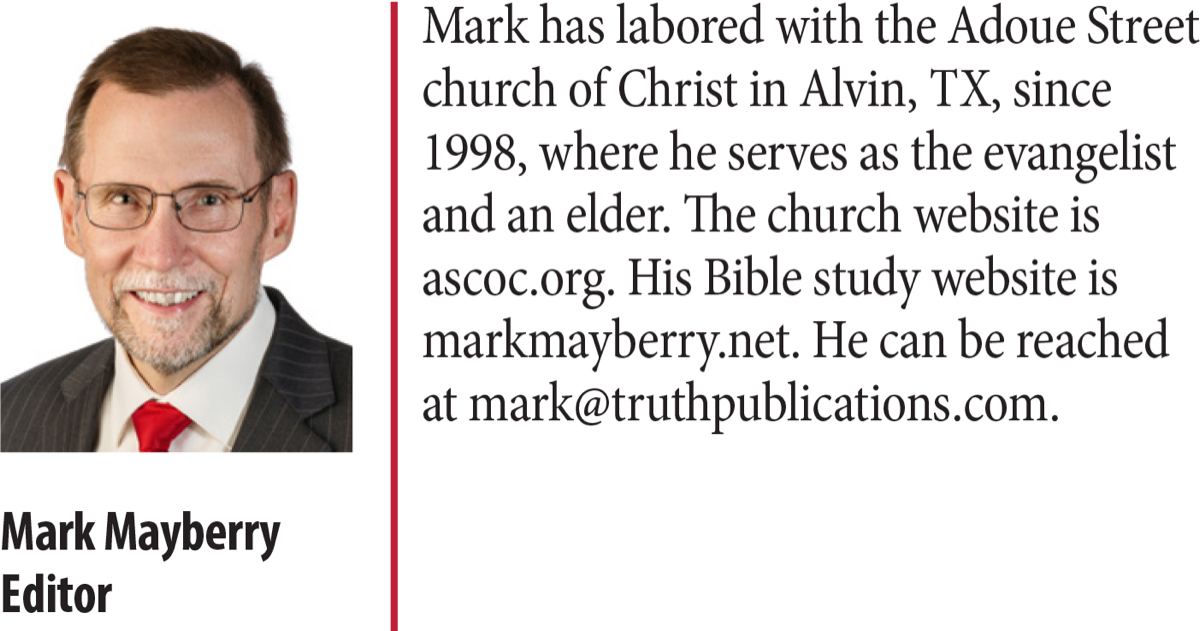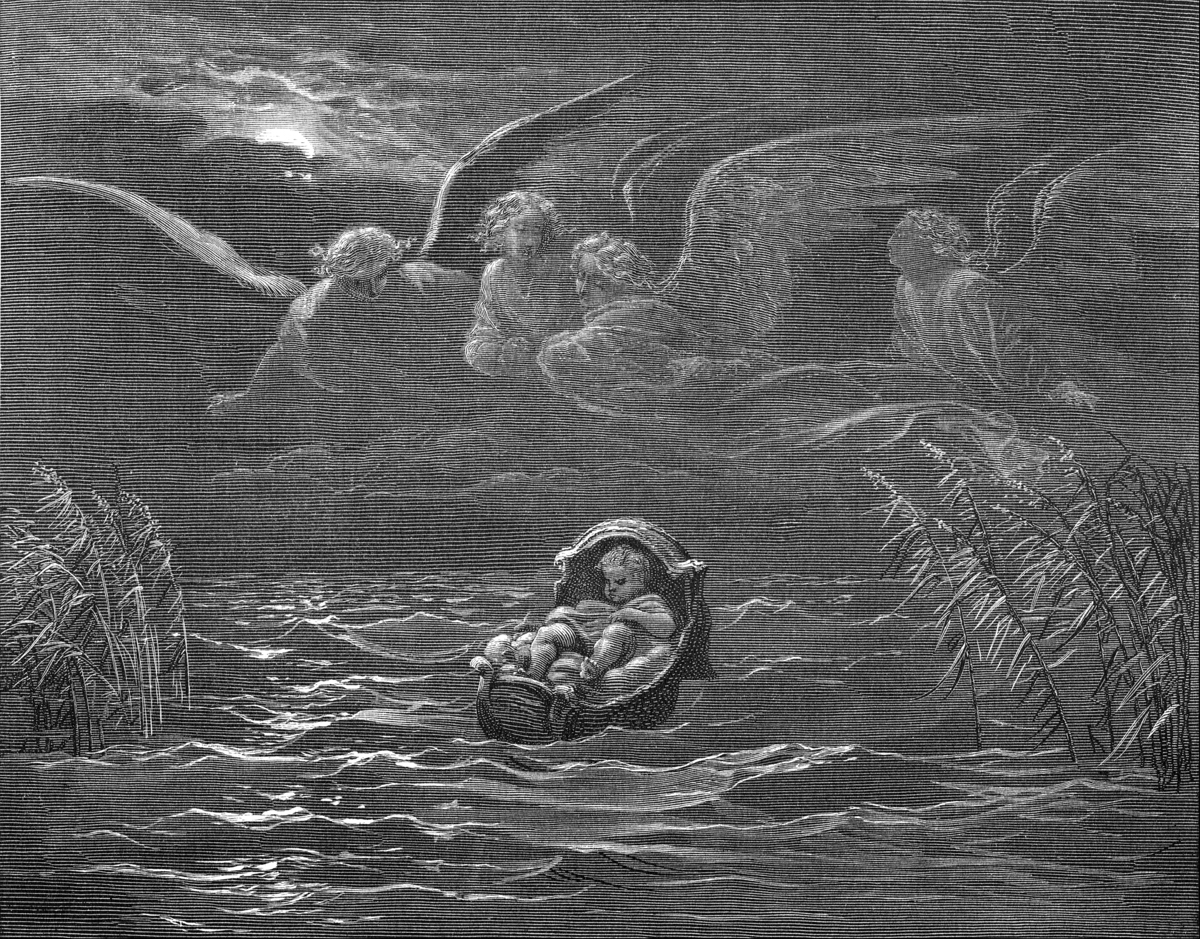By Mark Mayberry
Synopsis: In a culture that is hostile to Christian faith, God’s people need the courage and commitment to remain distinctive. May we let our lights shine in this dark world!
Miriam, Aaron, and Moses were the children of Amram and Jochebed (Exod. 6:20). While Moses is the most famous of these siblings, the scriptural record contains enough details that we can learn valuable lessons from each.
As a young girl, Miriam showed compassion in watching over her baby brother, Moses, and evidenced courage by acting decisively to help protect his physical and spiritual wellbeing (Exod. 2:1-10).
Put yourself in her position. Miriam, a simple slave girl, as she watches over her brother as he floated among the reeds in a wicker basked. Along comes a princess of Egypt and her maidens, who discover the basket held a crying child.
In your mind, allow time to stop and ponder the significance of this moment. What divergent paths could the story here take? If the Egyptian princes possesses the callous spirit of her father, she would say, “It’s nothing but an accursed Israelite’s male child. Toss him into the Nile and leave him for the crocodiles.” If she was flighty and bubble-headed, the surrounding sights and sounds might have quickly distracted her: “Look, an Ibis!” (i.e., a bird that was venerated in ancient Egypt and considered sacred). Instead, she showed compassion: The daughter of Pharaoh has pity on the child, saying, “This is one of the Hebrews’ children.” The Hebrew word chamal, translated “pity,” means “to have compassion” (Koehler, 328) or “to become responsible. . . to spare” (BDB, 328). What a mature young lady!
However, a second dramatic pause immediately follows. Having witnessed this scene from a distance (Exod. 2:4), Miriam now faced a choice. She was a slave girl in the presence of Egyptian royalty. In Egyptian mythology, Pharaoh was a god. His children shared in his divinity. According to the superstitions of the age, Miriam was not merely in the presence of a princess, she was in the presence of a goddess. Did she run? Did she hide? Did she remain silent? Remarkably, this young slave girl summoned the courage to speak: “Shall I go and call a nurse for you from the Hebrew women that she may nurse the child for you?”
Pharaoh’s daughter said to her, “Go ahead.” So the girl went and called the child’s mother. Then Pharaoh’s daughter said to her, “Take this child away and nurse him for me and I will give you your wages.” So the woman took the child and nursed him.
The child grew, and she brought him to Pharaoh’s daughter and he became her son. And she named him Moses, and said, “Because I drew him out of the water.”
Carpe diem (Latin: “pluck the day” or “seize the day”) is a phrase made famous by the Roman poet, Horace, which expresses the idea that one should enjoy life while one can.
Carpe diem is part of Horace’s injunction “carpe diem quam minimum credula postero,” which appears in his Odes (I.11), published in 23 BCE. It can be translated literally as “pluck the day, trusting as little as possible in the next one.” The phrase carpe diem has come to stand for Horace’s entire injunction, and it is more widely known as “seize the day” (Britannica).
While many apply this concept to the pursuit of pleasure, the apostle Paul, in two of his prison epistles, provides a more meaningful and moral application: We should redeem the time, i.e., make the most of the opportunities afforded each day (Eph. 5:15-16). Specifically, this includes the value of thoughtful and timely speech (Col. 4:5-6).
Yes, there is a time to be silent, but there is also a time to speak (Eccl. 3:1, 7b). May we recognize the power of a word spoken properly in the right circumstances (Prov. 25:11-15).
Like apples of gold in settings of silver is a word spoken in right circumstances. Like an earring of gold and an ornament of fine gold is a wise reprover to a listening ear. Like the cold of snow in the time of harvest is a faithful messenger to those who send him, for he refreshes the soul of his masters. Like clouds and wind without rain is a man who boasts of his gifts falsely. By forbearance, a ruler may be persuaded, and a soft tongue breaks the bone (Prov. 25:11-15).
If Miriam cowered in silence, what would happen to Moses? Would they ever see him again? How would he be raised? Her brother’s future and her mother’s happiness hung in the balance. Yet these seconds were even more momentous. Although Miriam did not know it, her people’s destiny, and (in a sense) the hope of the world, was hanging in the balance.
Yes, it is true that God’s eternal purpose would be realized, one way or the other. As Jehoshaphat, king of Judah, once said, “O LORD, the God of our fathers, are You not God in the heavens? And are You not ruler over all the kingdoms of the nations? Power and might are in Your hand so that no one can stand against You” (2 Chron. 20:6).
While God affects human affairs by fiat, divine providence is frequently felt indirectly through the lives of his faithful followers (Esther 4:13-14).
After God delivered Israel from Egyptian captivity, and the army of Pharaoh lay dead of the shores of the Red Sea, Miriam, the prophetess, showed conviction in leading the women in praise to God, as the nation of Israel celebrated their deliverance from captivity (Exod. 15:1-21, esp. vv. 20-21). Elsewhere, she is identified as one sent by God (Micah 6:4). Like Miriam, we should have sufficient faith to praise God openly.
Unfortunately, Miriam also struggled with critical attitudes that sometimes take root in our hearts. Miriam and Aaron murmured against Moses because of the Cushite woman whom he had married (Num. 12:1-10). Part of their complaint was personal. Miriam and Aaron didn’t like their sister-in-law, which may have resulted from cultural or racial prejudice. Part of their complaint was prideful. They said, “Has the Lord indeed spoken only through Moses? Has He not spoken through us as well?”
God rebuked both Aaron and Miriam, temporarily afflicting her with leprosy to emphasize the shamefulness of their actions. Yet, He mercifully ended her punishment, and restored her to a position of honor in Israel.
Why did God judge Miriam so severely? So that she might learn humility and respect. She was the older sister, but that did not grant her superiority. Miriam and Aaron also needed to acknowledge God’s right to accomplish His purposes in His own way. In a sense, the Lord manifested remarkable patience. During the wilderness wandering, others who rebelled against Moses faced much harsher judgment. Miriam is not mentioned again until her death and burial at Kadesh in the Wilderness of Zin (Num. 20:1).
Aaron was the brother of Moses and Israel’s first high priest. He was three years older than Moses (Exod. 7:7). Aaron married Elisheba, who bore him four sons: Nadab and Abihu, Eleazar and Ithamar (Exod. 6:23).
Even though he was older than Moses, Aaron willingly served as his brother’s spokesman (Exod. 4:14-17). Moses and Aaron faithfully communicated God’s word to the elders of Israel, and performed signs in the sight of the people. As a result, the Israelites believed and worshipped God (Exod. 4:27-31). Moses and Aaron also faithfully communicated God’s command to Egypt’s obstinate ruler—performing signs, bring the plagues upon Israel’s pagan oppressors (Exod. 7:1-7).
Unfortunately, Aaron faltered with standing alone in the spotlight (Exod. 32:1-6). Sometimes we are faithful when surrounded by fellow-Christians, but stumble when standing alone. Assembling with the saints is a significant source of spiritual encouragement (Heb. 10:23-25). Faithful brethren exhort one another through words and deeds (1 Thess. 5:11; Heb. 3:13).
Valuable lessons also come from considering the aftermath.
God’s Righteous Indignation: The Lord’s wrath was so great that He offered to destroy Israel and raise up a nation from Moses (Exod. 32:7-10).
Moses’s Humble Entreaty: Pleading for the people, Moses asked the Lord to turn from his burning anger, and remember the promises He had made to Abraham, Isaac, and Israel (Exod. 32:11-14).
Moses’s Burning Anger: When he came down from the mount, and observed Israel’s decadent behavior, Moses also was filled with righteous indignation. He took the golden calf, burned it with fire, ground it to powder, and cast the dust into the brook that flowed down from Mt. Horeb—so that the people drank it (Exod. 32:15-20; Deut. 9:15-21).
Aaron’s Evasive Answer: Afterward, Moses questioned his brother, saying, “What did this people do to you, that you have brought such great sin upon them?” Instead of accepting responsibility, Aaron prevaricated and passed the buck (Exod. 32:21-24).
Moses’s Courageous Challenge: In contrast with the cowardice of Aaron, Moses was boldly called out, “Whoever is for the LORD, come to me!” The Levites responded, and exacted revenge upon their brethren without regard for friendship or family (Exod. 32:25-29).
God’s Summary Statement: Afterwards, God also punished Israel by means of His holy angel—reminding us it is a fearful thing to fall into the hands of the living God (Exod. 32:30-35; cf. Heb. 10:28-31).
Moses is called “the servant of the Lord” or “the servant of God” over twenty times in the Old Testament.
Consider the commendation of Moses found in Hebrews 11:23-29.
By faith Moses, when he was born, was hidden for three months by his parents, because they saw he was a beautiful child; and they were not afraid of the king’s edict. By faith Moses, when he had grown up, refused to be called the son of Pharaoh’s daughter, choosing rather to endure ill-treatment with the people of God than to enjoy the passing pleasures of sin, considering the reproach of Christ greater riches than the treasures of Egypt; for he was looking to the reward. By faith he left Egypt, not fearing the wrath of the king; for he endured, as seeing Him who is unseen. By faith he kept the Passover and the sprinkling of the blood, so that he who destroyed the firstborn would not touch them. By faith they passed through the Red Sea as though they were passing through dry land; and the Egyptians, when they attempted it, were drowned (Heb. 11:23-29).
Moses benefited from the faithful choices of his parents, Amram and Jochebed (Exod. 2:1-4; 6:20). In fact, his conception and continued existence were the result of their faith. They chose life rather than death. They chose faith rather than fear. Moses benefited from the courage of his sister, Miriam, and the compassion of Pharaoh’s daughter (Exod. 2:5-10). In time, through the influence of his godly mother, Moses cast his lot with the people of God (Exod. 2:11-15).
While we might find much that could be criticized in this account, we also recognize that Moses did his best while facing difficult circumstances. Yes, inexperience resulted in rash action. Being impatient and impulsive, he took matters into his own hands.
Despite Moses’s halting efforts, there is much to commend.
He chose to endure ill-treatment with the people of God rather than enjoy the passing pleasures of sin.
He counted the reproach of Christ as having greater value than the treasures of Egypt.
He looked to the reward.
Instead of fearing the wrath of Egypt’s reigning monarch, he obeyed the King of Kings.
Moses refused. . . chose. . . considered. . . looked. . . left. . . endured. . . kept. . . passed. . .
What Privileges Have We Refused (Matt. 4:1-11)?
What Sufferings Have We Chosen (Matt. 5:10-12)?
What Object of Value Have We Considered (Matt. 13:45-46)?
What Goal Are Looking Toward (Col. 3:1-4)?
What Place Have We Left (Matt. 19:29)?
What Affliction Have We Endured (2 Cor. 4:17-18)?
What Commandments Have We Kept (1 John 2:3-6)?
What Transitions Have We Passed Through (John 5:24; 1 John 3:14).
What were the characteristic qualities of this great man?
Moses was courageous. He was not terrified by the advancing army of Pharaoh, but said, “Do not fear! Stand by and see the salvation of the LORD which He will accomplish for you today; for the Egyptians whom you have seen today, you will never see them again forever.”The LORD will fight for you while you keep silent” (Exod. 14:5-31, esp. vv. 13-14).
Moses was committed to God. He fearlessly stood up for the truth, despite Israel’s transgression. He challenged the Israelites by saying, “Whoever is on the Lord’s side, come over to me!” (Exod. 32:19-28, esp. vv. 25-27).
Moses was compassionate. When the Israelites believed the evil report of the ten faithless spies, God offered to destroy the people and raise up a new nation from the seed of Moses. However, Moses asked the Lord to pardon and forgive His chosen people (Num. 14:6-23, esp. vv. 13-19).
Moses was not a perfect man. In fact, his own transgression kept him from entering the promised land (Deut. 32:48-52; 34:1-8). Nevertheless, he embodied those qualities of an ideal leader/servant. The coming Messiah would be like unto Moses—only greater (Deut. 18:15-18; cf. Acts 3:17-26; Heb. 3:5-13).
These Old Testament events contain valuable lessons for Christians. Israel was delivered from the slavery of Egypt just as we are delivered from the slavery of sin. In crossing the Red Sea, they were symbolically baptized unto Moses in the cloud and in the sea. In like manner, Christian baptism marks a transition from the slavery of sin to the forgiveness and freedom made possible by Christ Jesus. However, we must remain faithful if we hope to cross over spiritual Jordan to receive our promised reward (1 Cor. 10:6-7).
Britannica, Editors of the Encyclopaedia. “Carpe Diem.” Encyclopedia Britannica, September 13, 2022. https://www.britannica.com/topic/carpe-diem.
Brown, Francis, Samuel Rolles Driver, and Charles Augustus Briggs. Enhanced Brown-Driver-Briggs Hebrew and English Lexicon. Oxford: Clarendon Press, 1977.
Koehler, Ludwig, et al. The Hebrew and Aramaic Lexicon of the Old Testament. Leiden: E.J. Brill, 1994–2000.




